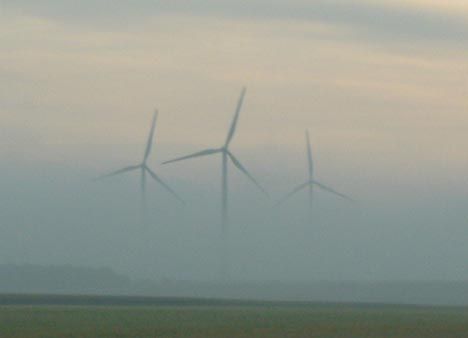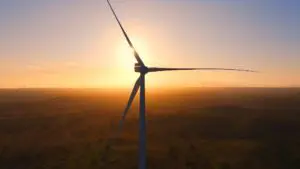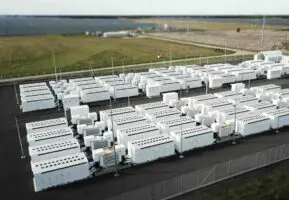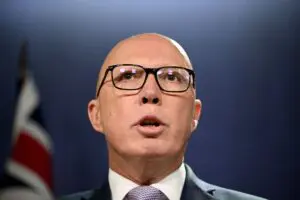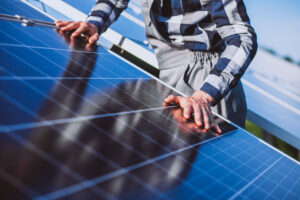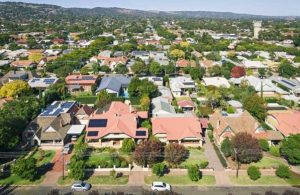It barely seems believable, but the politics of energy has just gotten worse. A week that began with a bizarre push to extend the life of a decrepit, 50-year-old power plant in the hope of keeping the lights on, finished with the Nationals demanding that no further subsidies be given to renewable energy.
Instead, they said, they should be given to last century’s technology: coal. At their annual conference on the weekend, the National voted, in effect, for a coal energy target. It wants the federal government to give out loans to support the coal industry, and trade minister Steve Ciobo announced new rules that will allow EFIC, the government trade investment institution, to invest in struggling coal export projects because major banks won’t.
Nationals leader and deputy prime minister Barnaby Joyce continued his bizarre riff about people being stuck in lifts, desperate to go to the loo, if the energy system had too much wind and solar. He seemed to think that closing Liddell in 2022 would cause the lights to go out in 2017.
Former resources minister, and Joyce’s ex chief of staff Matt Canavan, joined in, describing renewables as a “short term sugar hit” for jobs.
“We’ve taken all the subsidies away from our farming sector and now the biggest protection racket going around is in our renewable energy sector,” Canavan told the conference.”
Even this comment was too much for the “moderates” in the Coalition, who insisted through energy and environment minister Josh Frydenberg that renewables have a future in the energy mix. But just how much is difficult to judge.
It is Turnbull and Frydenberg who have been trying to appease the Nationals and the ideologues within their own part by insisting that the ageing and unreliable Liddell coal generator be kept open, and have been piling pressure on AGL – in the form of an investigation into market bidding practices – to try and force their hand.
As we have noted before, the politics of energy has become less and less credible as each week passes by. We’ve noted how the debate within the Coalition government has been hijacked by the right, and about the conservatives have gone “completely nuts” over new technologies such as battery storage, and Tesla’s big battery in particular.
The Liddell intervention is extraordinary, as ITK analyst David Leitch points out in our weekly Energy Insiders podcast and in this column: Bullying, cronyism and Captain’s picks.
Leitch compares the government’s latest intervention like that of Venezuela, given that it lacks probity, would likely kill smarter, cleaner and much cheaper projects, and was yet another example of policy on the run.
Chloe Munro, the new head of AEMO’s expert advisory panel, and a panel member of the Finkel Review and a former chair of the Clean Energy Regulator, describes the move on Liddell – and the government’s involvement, as “mystifying” – given it goes against the advice of both AEMO reports and the Finkel Review itself.
Indeed, given how depressing the political debate on energy has become, it is reassuring that there are discussions taking place at high level that are looking for serious solutions to the energy transition, to ensure that it does lead to a cheaper, smarter, cleaner and more reliable grid than we have now.
(If you do wish to listen to a sane discussion about energy policy, we recommend you listen to Munro’s guest appearance on our weekly Energy Insiders podcast.)
Sanity, however, has no place in the Murdoch media, which is heaping pressure on the Coalition government to bend to conservative ideologues and fossil fuel vested interests, with relentless fact-free attacks on state-based initiatives and the federal contemplation of Finkel’s proposed CET.
Last week, The Australian claimed that the renewable energy target would cost taxpayers $60 billion – a figure seemingly plucked from their imagination – and suggested that 10 large nuclear power stations could be built for the same price.
The co-author of that report, economics writer Adam Creighton, continued the delirium on Monday, branding the renewable energy target as “bonkers” and proposing that all the problems could be solved by building nuclear power stations.
One assumes he didn’t read either of the AEMO reports, the Finkel Review, the CSIRO/ENA reports, Transgrid’s vision of a 100 per cent renewable energy grid, or talked seriously to anyone not completely invested in the fossil fuel industry.
One assumes also he didn’t notice the reason for new nuclear reactors being canned in the US – soaring costs ($A30 billion each) and endless delays – or the decision to close down Florida’s main nuclear supply when faced with wind gusts slightly less than those which hit South Australia last September.
The Courier-Mail also insisted on a new coal-fired generator in north Queensland – the pet project of Canavan – even though AEMO made it clear that no such project was needed.
“Unless Labor scraps its loopy renewables energy targets, Australia will go broke,” it says, proving that former ABC political editor Chis Uhlmann (who predicted a national blackout if we have more wind and solar) and the Courier-Mail’s peers in The Australian do not have a mortgage on energy hyperbole.
As ITK’s David Leitch points out, the discussion around energy options in Australia is now completely ignoring technical and other issues, and is based only around politics.
For the record, the AEMO reports – despite what you may read in mainstream media – made no recommendation to keep Liddell open for an extra five years. Far from it. AEMO suggests a range of mechanisms – such as a strategic reserve and reliability obligations – that should make any government intervention redundant.
But the Coalition is now terrified by the reality that, without government intervention, the money will flow to renewables and smart technologies that will likely accelerate the departure of coal generation, rather than extend their life.
AEMO says there are proposals for more than 21GW of new wind and solar . It expresses a clear preference for flexible and dispatchable generation. “That doesn’t sound very much like keeping Liddell open,” Munro says.
The conservatives, however, have pinned their policy decision on an increasingly redundant concept, “baseload” power, despite the fact that this bears no relation to the concept of “reliability”.
As the AEMO report points out, the biggest threat to electricity supplies over coming years is the failure of a large coal or gas generator, and “that is quite likely” due to their age, and their vulnerability to heat, as the market discovered last summer on repeated occasions.
One sane voice at The Australian is Alan Kohler, who points out that despite the bluster of the Nationals and the conservatives within the Liberal Party, everybody knows coal-fired power stations must close if Australia is to meet the 2 degree commitment that everybody agreed to in 2015.
“The task of leadership is to prepare for that, not yearn for coal,” he writes.
“The Australian Energy Market Operator has made it clear the closures can be handled through demand management and some NEM redesign, with even more renewables and batteries, which is what’s happening anyway because that’s what businesses and investors want to invest in.
“There won’t be any new coal power stations, and the lives of existing ones won’t be extended unless the government, bizarrely and unnecessarily, pays for it.
“If that happened, it would bring about the final divorce of business and the Coalition, and the final retreat by Malcolm Turnbull into the loony fog inhabited by Donald Trump and the coal dancers on the Coalition’s right.”

